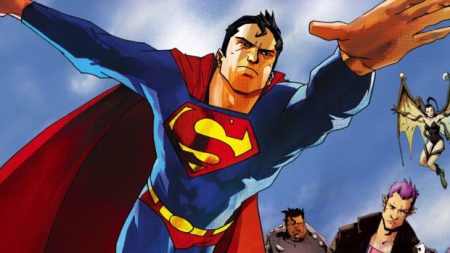A Perfect Satire?
Written by Nathan Liu
For the longest time, I wasn’t sure what to make of satire. In all honesty, I didn’t even know how to define it. Over the years, I received a variety of references and tools to help identify it. Questions like “does it criticize a particular aspect of society?” “Does it try to make things better?” “Does it exaggerate and heighten?” And, most importantly, “does it outrage and anger?” became useful parameters through which to assess my writing’s satirical credentials. And yet, even with these tools, I still struggled to write satire. I understood everything in theory, but not so much in practice. So I did what I normally do when I’m confused and need a break, I watched a superhero movie. Specifically, I revisited the 2012 animated film, “Superman Vs. The Elite.” As I was watching, something hit me. This was it. This movie was the tangible, visible application of all the principles I’d been looking for. This film was a perfect example of satire.

For those of you who don’t know, the film tells the story of Superman going up against a new team of vigilantes called The Elite. These “heroes” are narcissistic, quick-to-anger, and willing to kill and cause massive amounts of collateral damage in order to stop bad guys. They mock Superman for his old-fashioned values, particularly his “no killing” rule, and claim that he’s outdated and ineffectual. And for a time, the public agrees with them. It gets to the point where people start turning on Superman, and he decides that it’s time to stop The Elite once and for all. They have a massive battle, during which Superman appears to lose his mind and kill his opponents. At the last minute, however, Superman stops, and reveals that this was all a ruse. He didn’t kill The Elite. He found a non-lethal way of disabling them and removing their powers. The “killing” the spectators saw was a means of demonstrating the danger of using violence as a first response. As Superman explains to The Elite’s leader, “They saw the ugliness of violence as a solution and it frightened them. It frightened me too when I decided to cross that line and do what you do. It’s so easy; anger, vengeance. Luckily, I’m not you. And I never will be.”
Now at this point you might be wondering what this has to do with satire. Well, as a matter of fact, it has everything to do with it. Superman’s final performance uses all the tools of satire. He’s “criticizing an aspect of society,” specifically, people’s desire to use violence to solve problems. He’s “trying to make things better” by showing that there are other, equally effective, non-lethal means of dealing with criminals. He’s “heightening and exaggerating” by acting even more reckless, dangerous, and scary than The Elite, and, in so doing, he’s creating outrage and anger. Who knew that an animated kid’s movie could so perfectly encapsulate satire?
Yes, this is a film about superheroes, and it includes solutions that couldn’t exist in the real world. But don’t kid yourself. Its messages about taking the moral high road and not sinking to your enemy’s level are very applicable to reality. Just replace Superman with the American government, and The Elite’s unscrupulous methods with bombing civilians and torturing suspected terrorists. That’s another reason why the film works as satire; it’s allegorical.
As such, I’d urge you all to watch this movie. Even if you don’t like Superman, or the superhero genre, it offers one of the clearest, most effective examples of satire in action. It helped me gain a better grasp of what the genre is, and how to write it. And if you give it a watch, it just might do so for you as well.

Nathan Liu is a screenwriter, playwright, and actor. Growing up in Germany and being part Chinese, he was exposed to different cultures, which led him to storytelling. His experience in film and theater includes penning scripts for OddOneOut Productions and Pixeldust Studios, and writing the play “Maggie” (New York Theater Festival 2019). He’s a guy who can talk about cinema, and Asian American identity for hours.